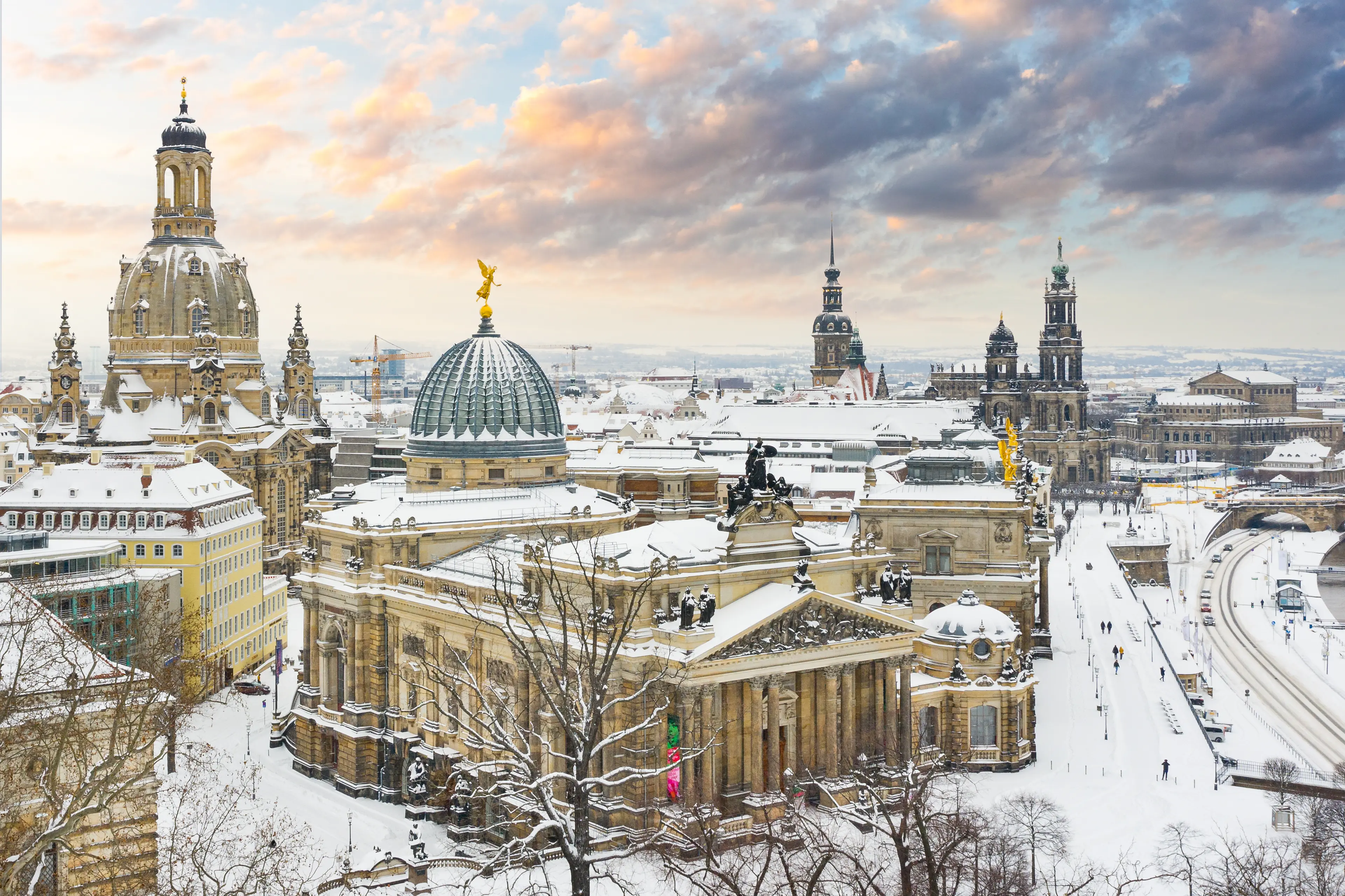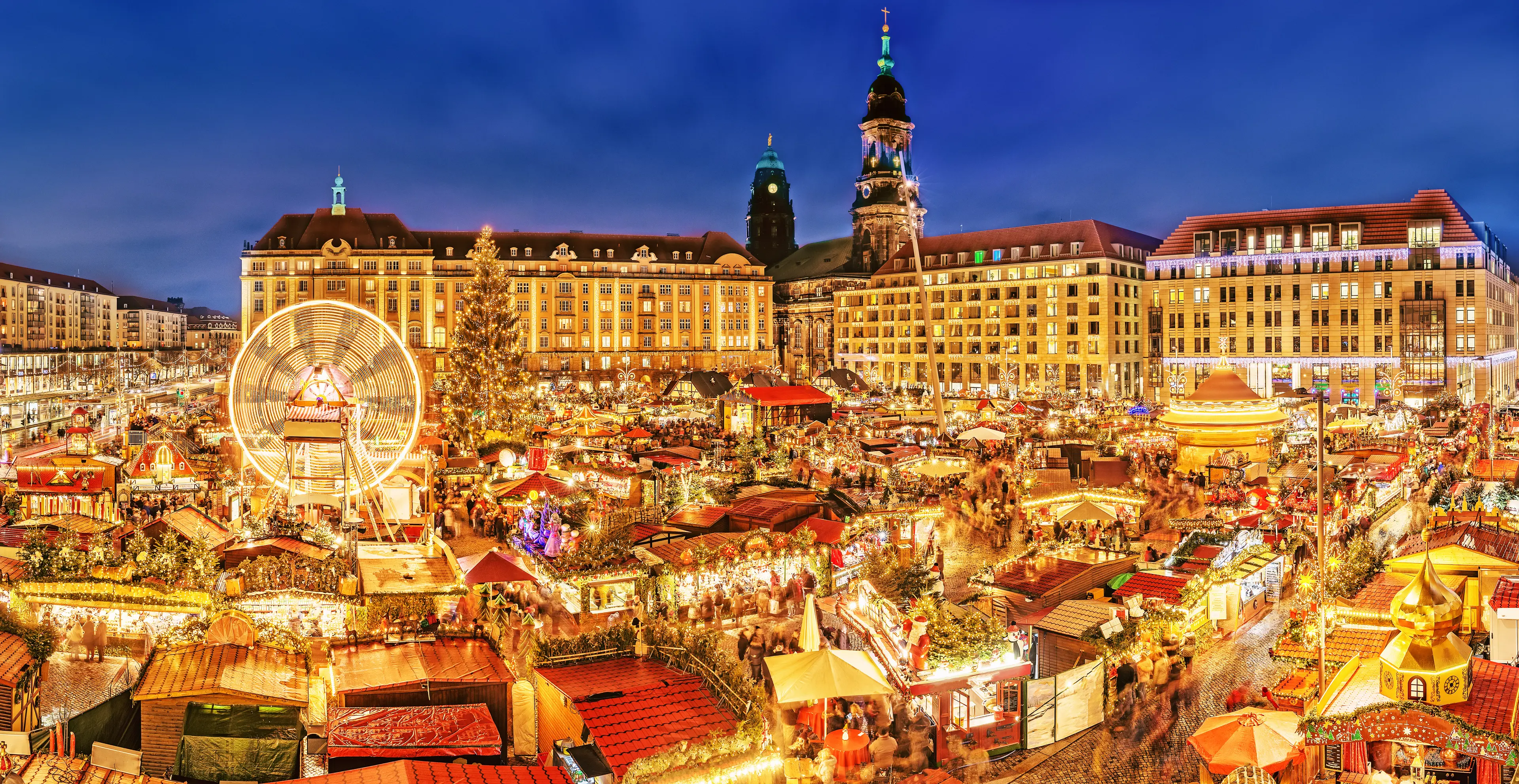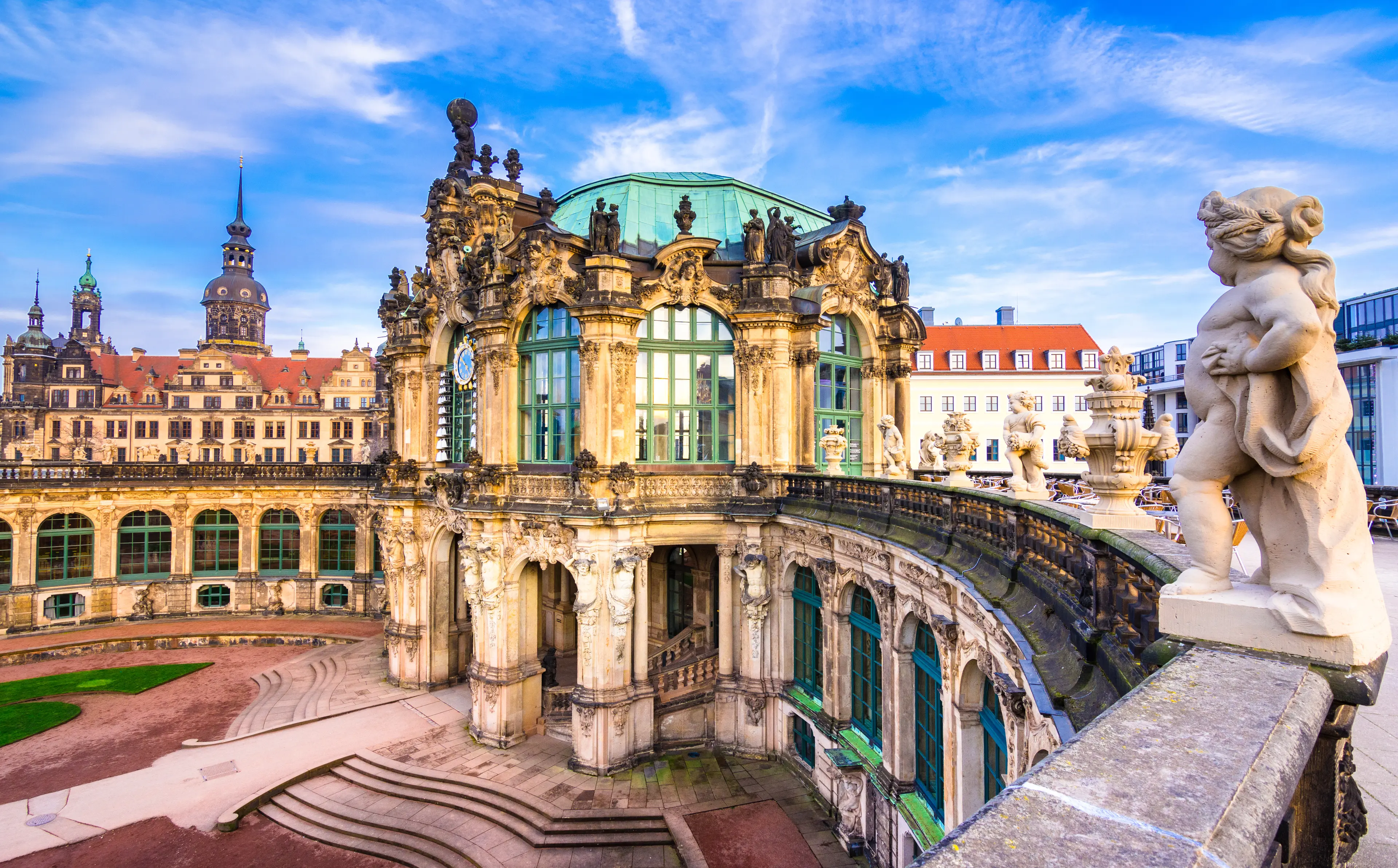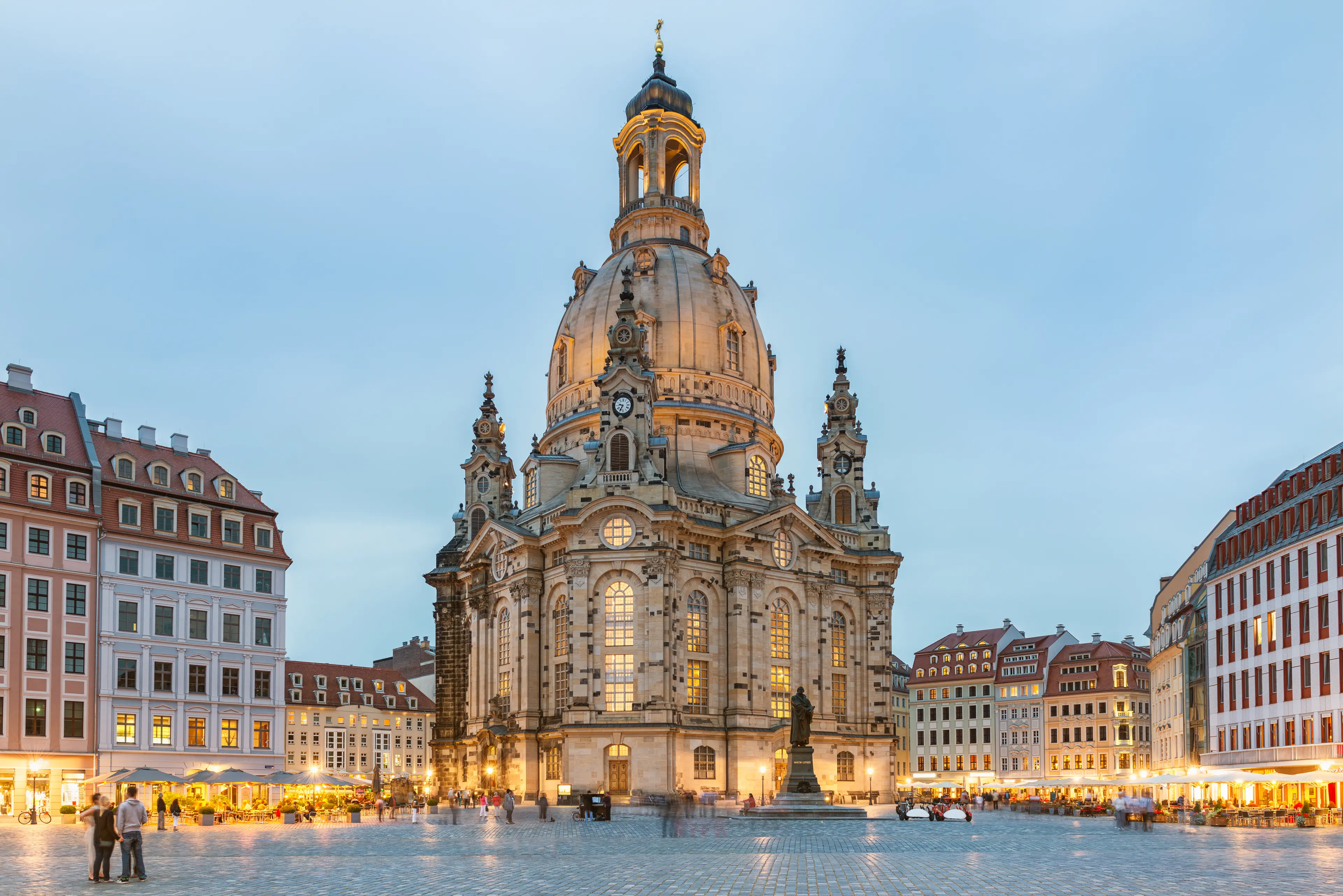3-Day Romantic Christmas Getaway Itinerary in Dresden, Germany
Dresden, Germany
3 days
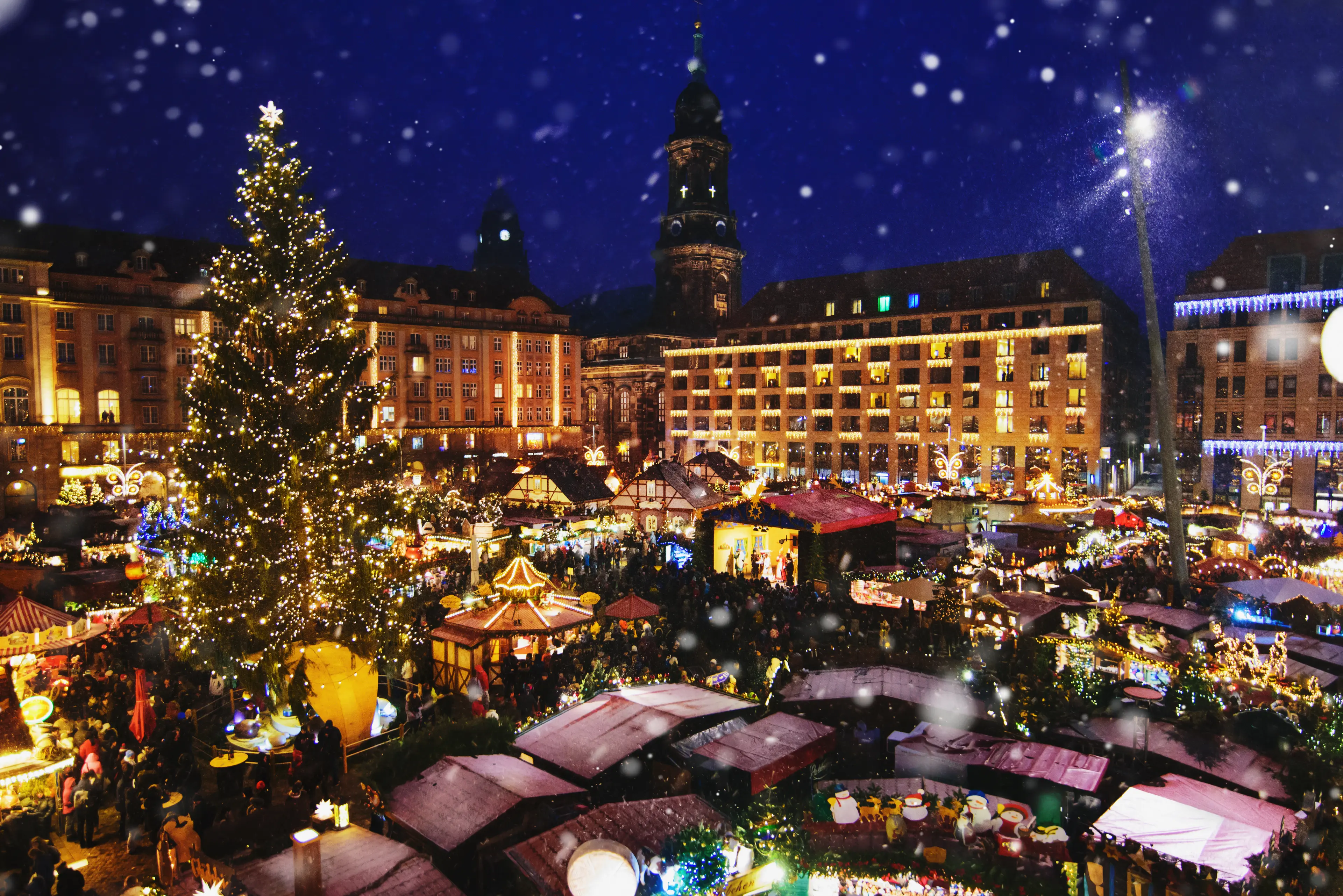
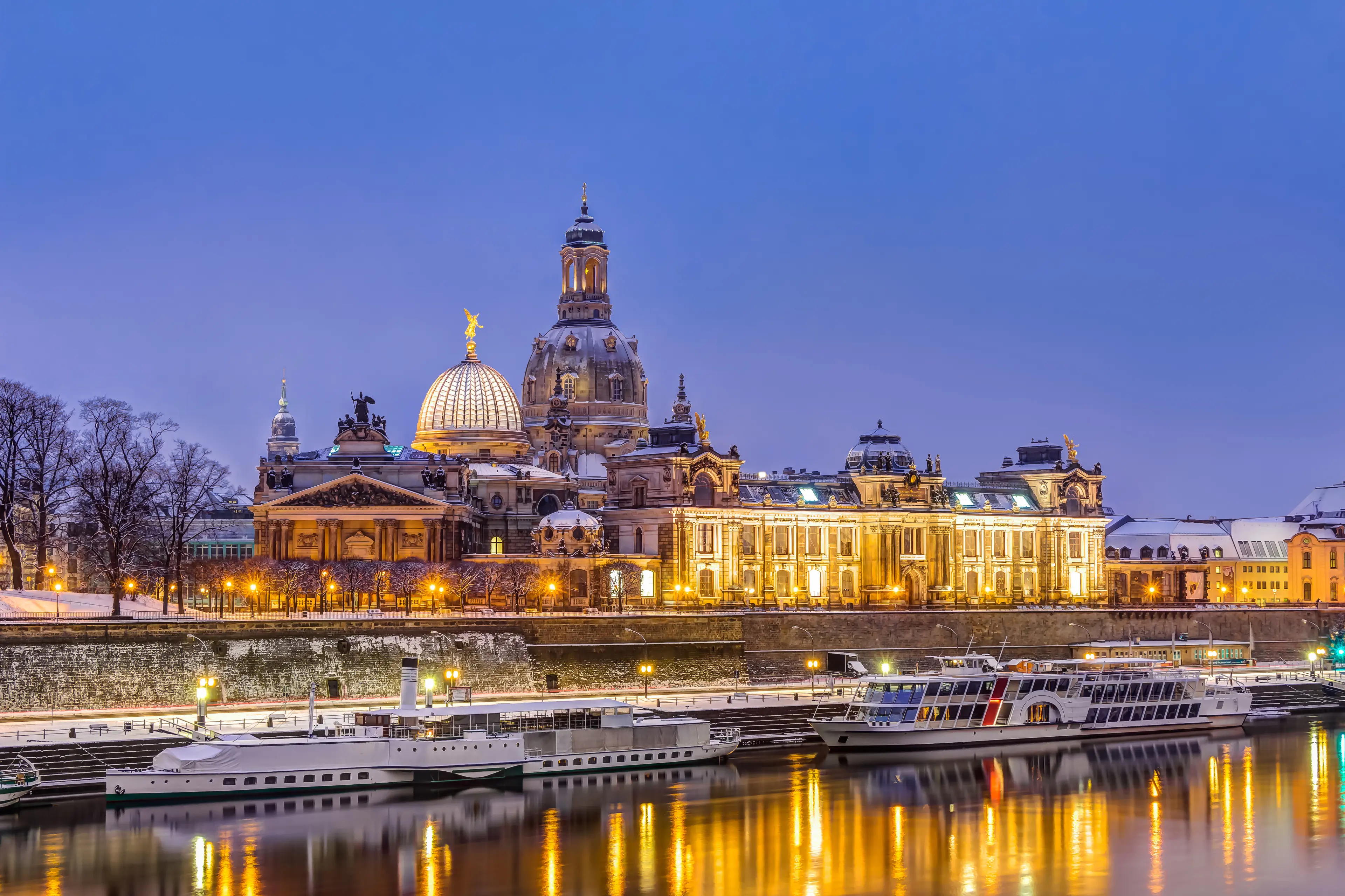
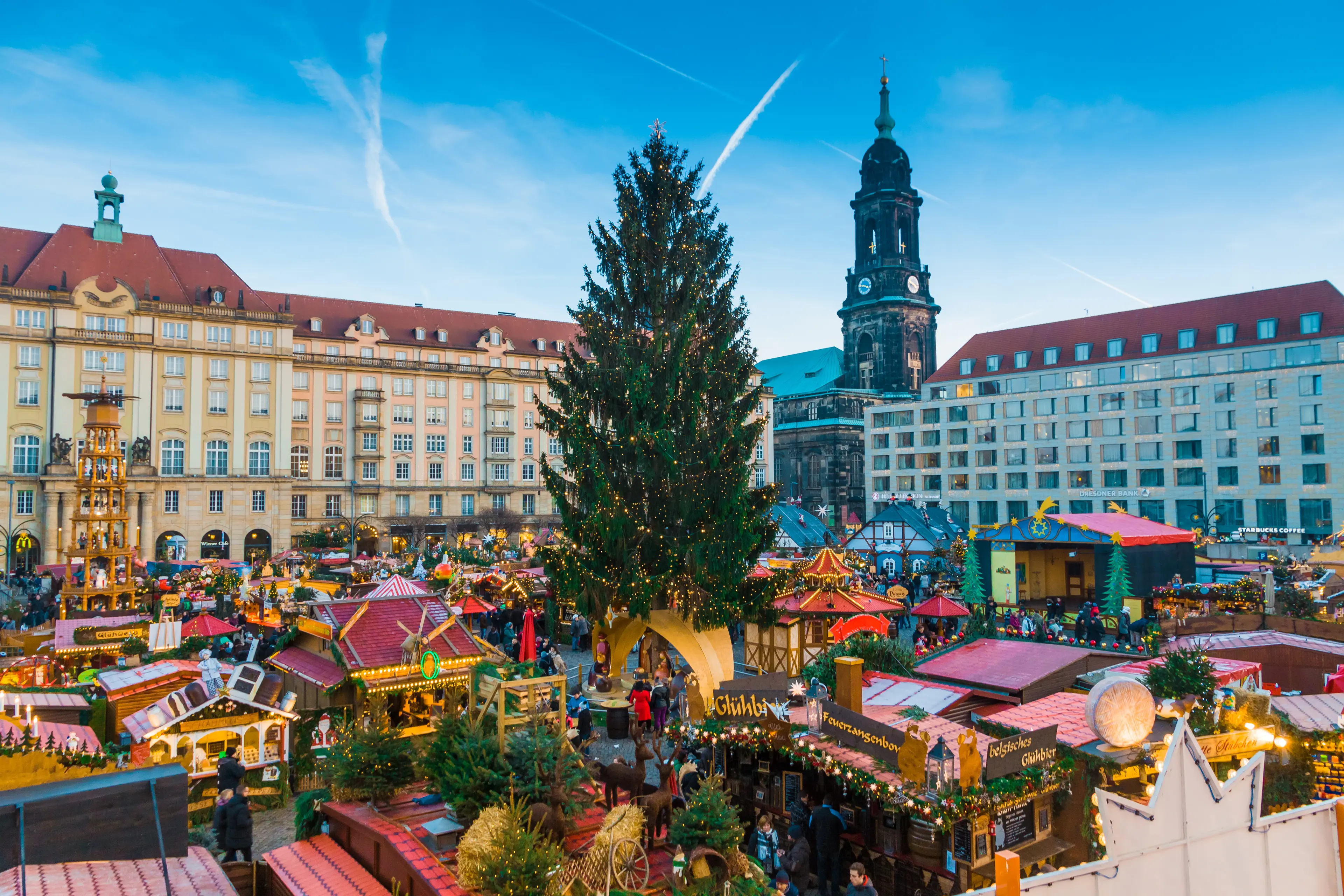
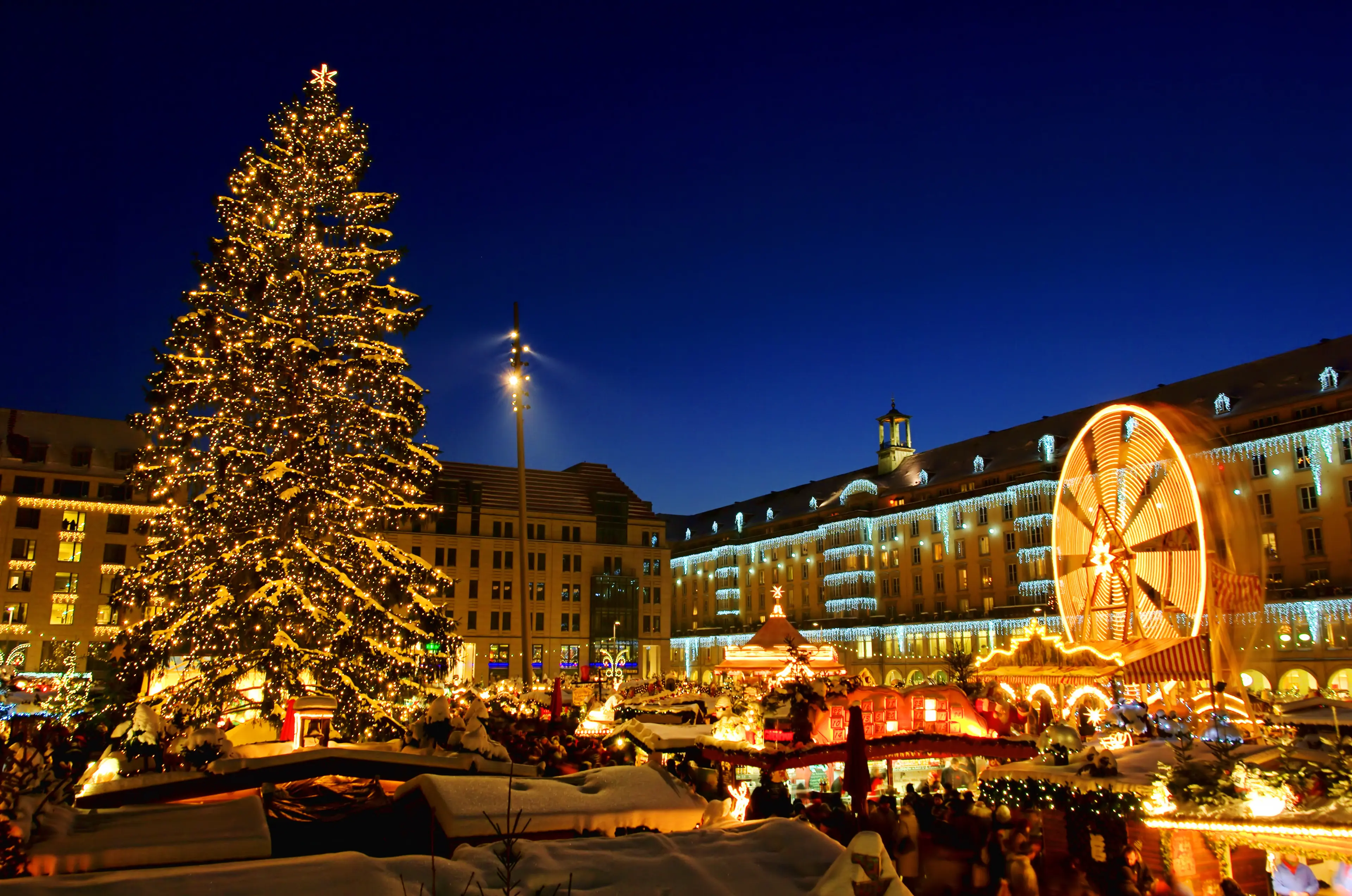
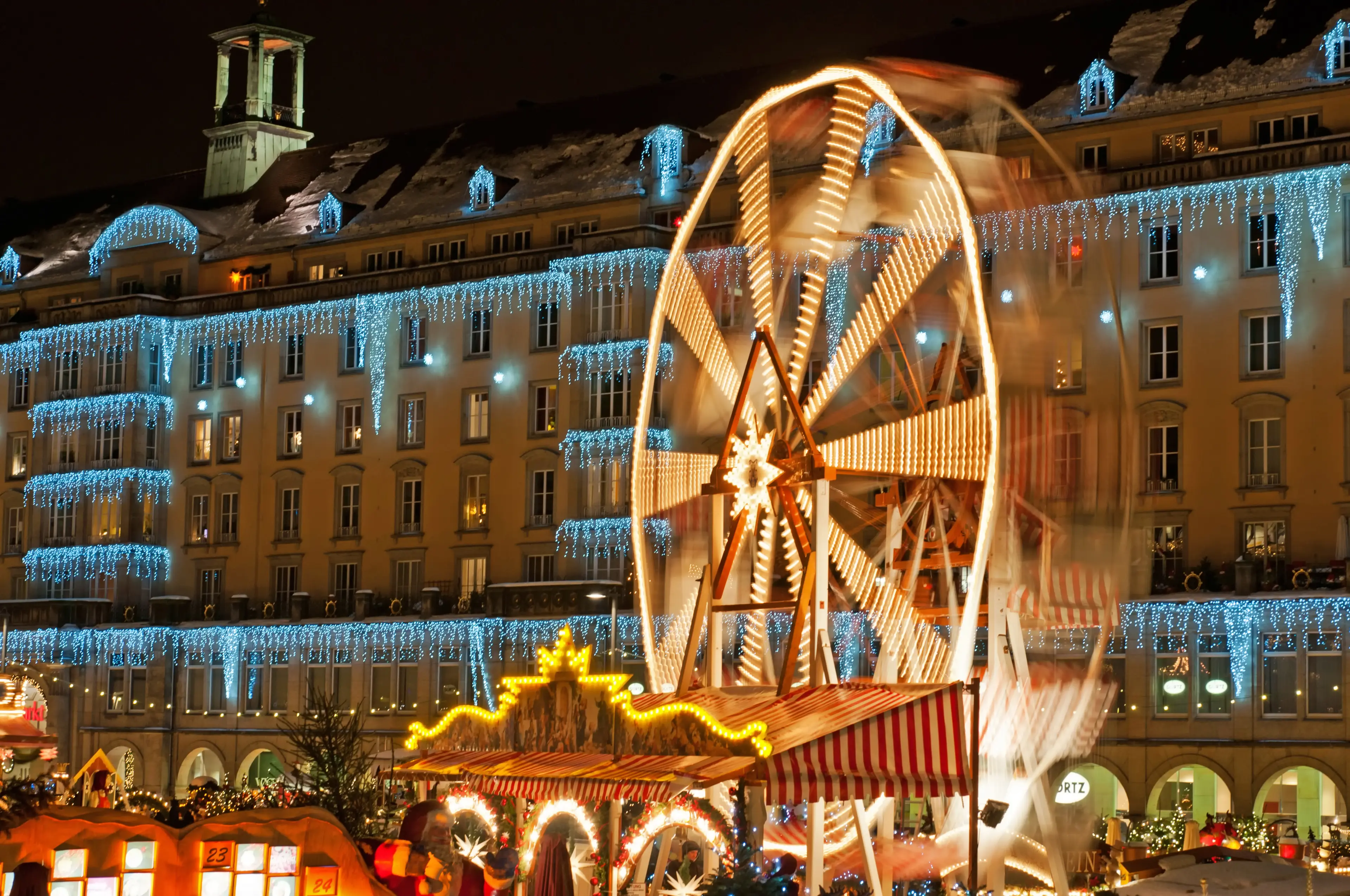
About Dresden, Germany
Experience the rich cultural heritage of Dresden, Germany, a city renowned for its stunning baroque architecture and vibrant arts scene. Explore the historic Old Town, home to the iconic Frauenkirche and Semperoper Opera House. Visit the Zwinger Palace, a masterpiece of baroque design housing world-class museums. Stroll along the Elbe River and enjoy the picturesque views of the city's skyline. Discover Dresden's intellectual side at the German Hygiene Museum and the Green Vault, Europe's richest treasure chamber. Indulge in local cuisine at charming eateries and sip on fine German beer at traditional pubs. Whether you're an art enthusiast, history buff, or food lover, Dresden offers a unique blend of experiences that captivate and inspire.
3-Day Itinerary
Day 2
Visit to Semperoper and Green Vault, and Striezelmarkt
Morning
Start your second day with a visit to the Semperoper, one of the most beautiful opera houses in the world. Take a guided tour to learn about its history and architecture.
Lunch
Have lunch in a restaurant in the Altstadt area, offering a variety of German and international dishes.
Afternoon
Spend the afternoon at the Green Vault in the Dresden Castle, home to a vast collection of treasures. Explore its two sections: the Historic Green Vault and the New Green Vault.
Dinner
Enjoy a romantic dinner in a restaurant in the Neustadt district, offering a variety of cuisines.
Evening
Visit the Striezelmarkt, Dresden's main Christmas market. Enjoy the festive atmosphere, the beautifully lit stalls, and the traditional Christmas treats.
Day 3
Walk along the Elbe River, visit to Pillnitz Castle, and Christmas Market
Morning
Start your last day with a walk along the Elbe River and visit the Loschwitz Bridge, also known as the Blue Wonder. Enjoy the beautiful views of the river and the city.
Lunch
Have lunch in a local restaurant in the Loschwitz area, offering a variety of German dishes.
Afternoon
Spend the afternoon exploring the Pillnitz Castle and Park, a beautiful Baroque palace surrounded by a large garden. Take a guided tour to learn about its history and architecture.
Dinner
Have your last dinner in Dresden in a restaurant in the Neustadt district, offering a variety of cuisines.
Evening
End your trip with a visit to the Christmas market in the Altstadt area. Enjoy the festive atmosphere, the beautifully decorated stalls, and the traditional Christmas treats.
Attractions in Itinerary (8)

1Dresden Frauenkirche
The Dresden Frauenkirche is a Lutheran church in Dresden, the capital of the German state of Saxony. It is considered an outstanding example of Protestant sacred architecture, featuring one of the largest domes in Europe.

2Zwinger Palace
A baroque palace that is now a museum complex, featuring gardens and galleries.

3Dresden Christmas Market
One of Germany's oldest Christmas markets with a very unique and traditional style. It offers a variety of stalls selling crafts, food, and drink.

4Semperoper
A renowned opera house that hosts performances of opera, ballet, and classical music.
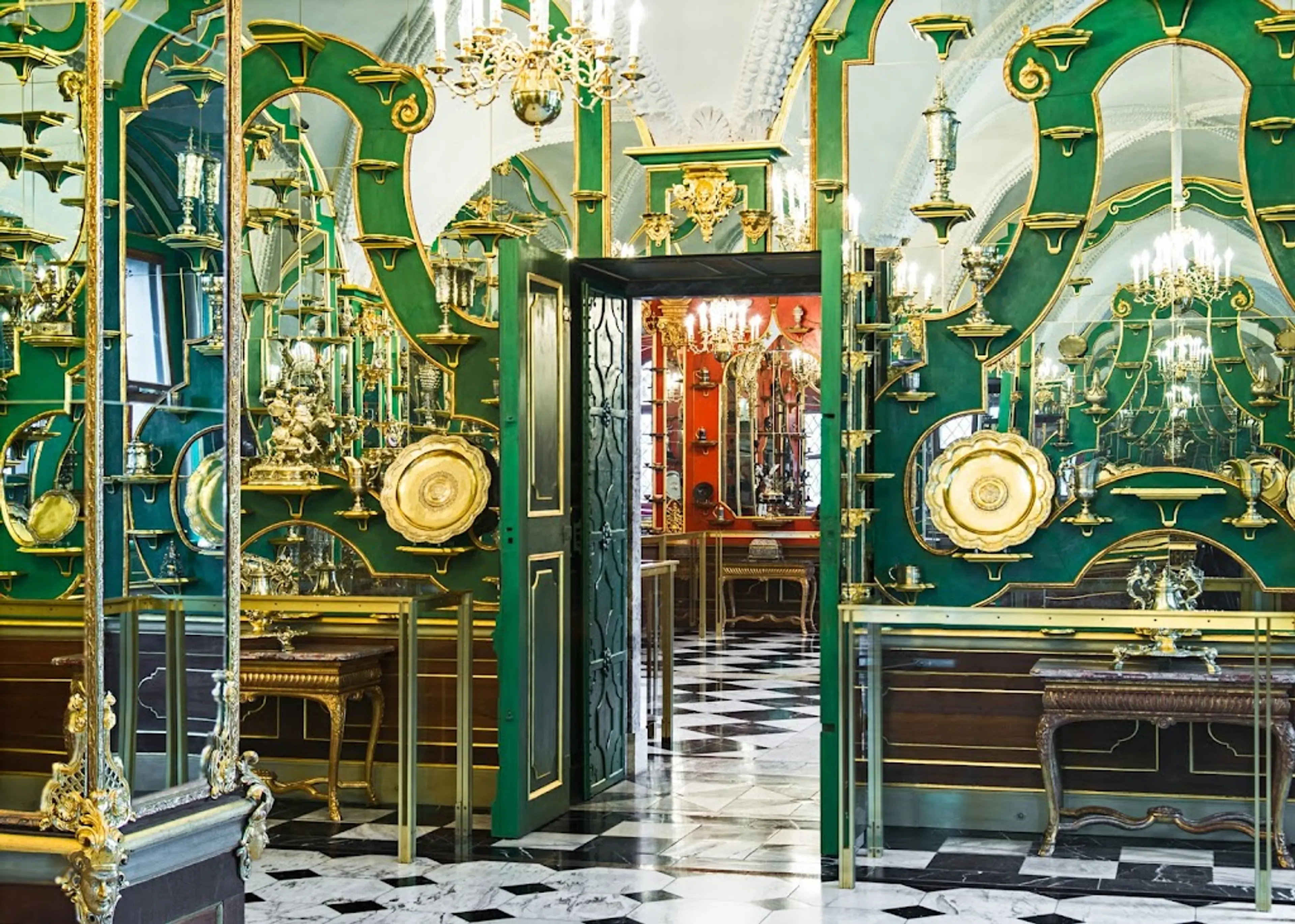
5Green Vault
One of the world's oldest museums, it contains the largest collection of treasures in Europe.
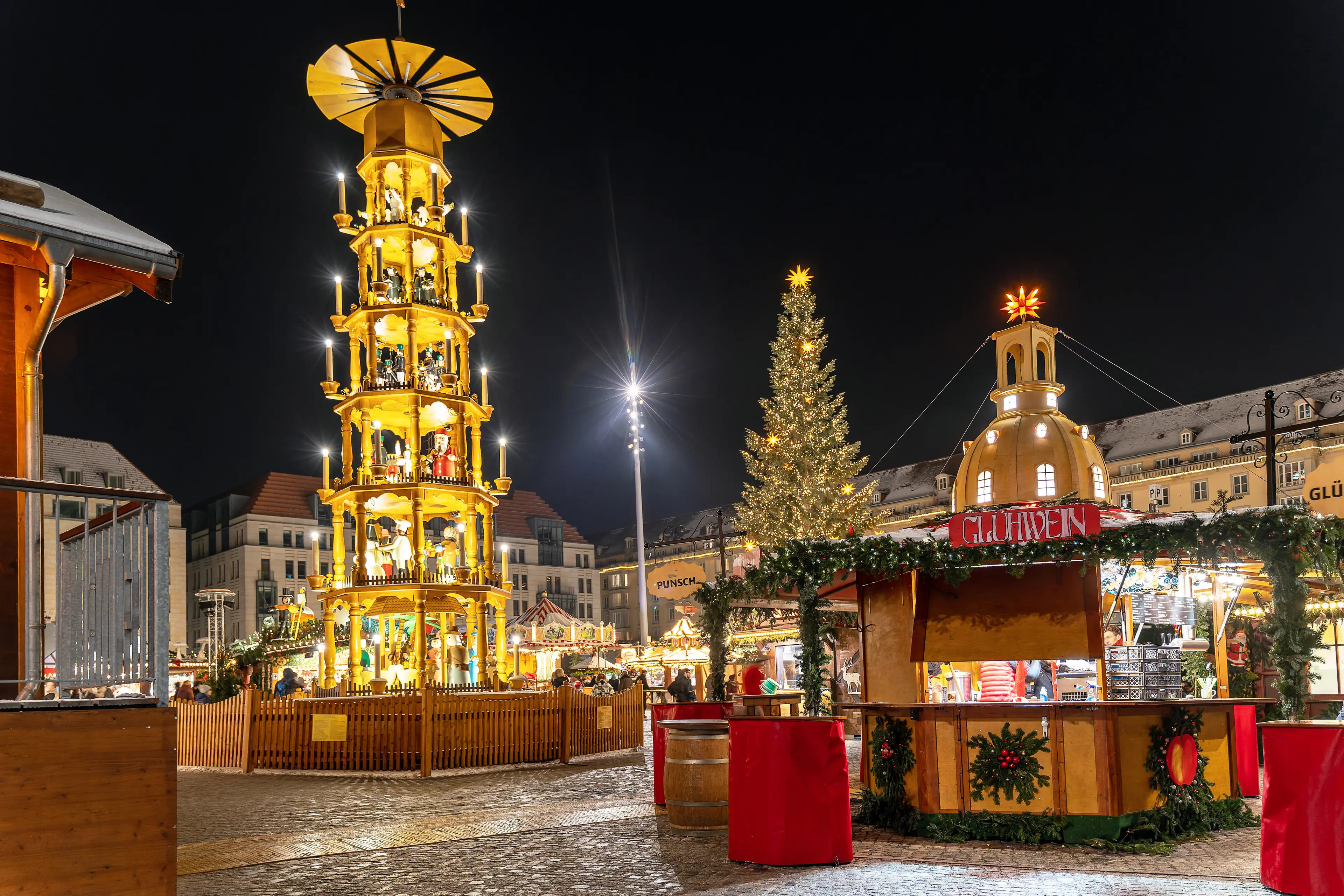
6Striezelmarkt
Striezelmarkt in Dresden is a must-visit during the holiday season. It is one of the oldest Christmas markets in Germany, offering a festive atmosphere, traditional crafts, and delicious food.
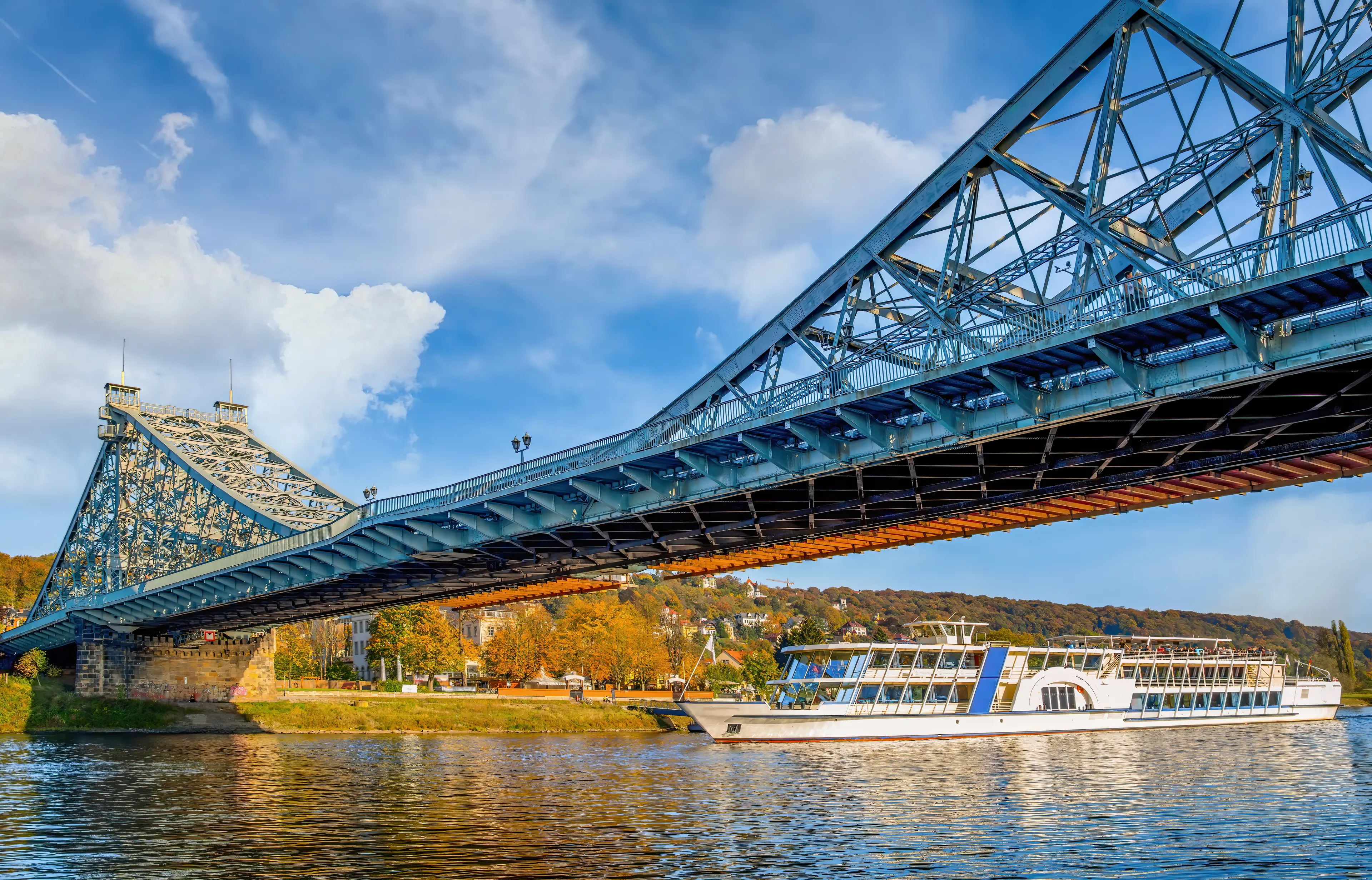
7Loschwitz Bridge
Also known as the Blue Wonder, the Loschwitz Bridge is a cantilever truss bridge over the Elbe River. It connects the districts of Blasewitz and Loschwitz, two of Dresden's most prestigious residential areas. It is notable for its distinctive blue color and its innovative design, which was considered a technological marvel when it was completed in 1893.
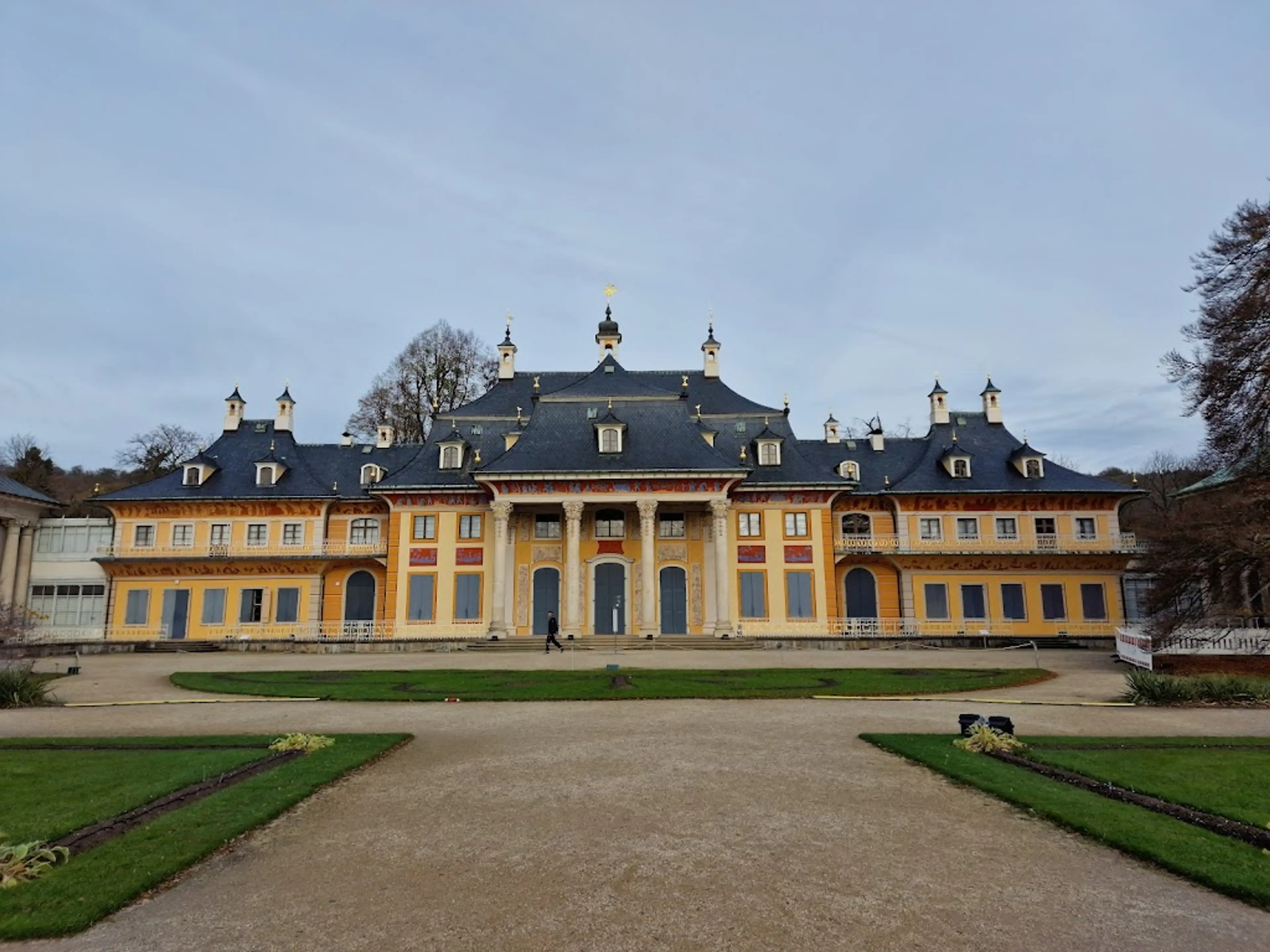
8Pillnitz Castle and Park
A beautiful baroque palace surrounded by a large park, located on the banks of the Elbe River.
Local Food and Drinks (12)

Eierschecke
A traditional Dresden cake with three layers: a yeast dough bottom, a creamy quark layer in the middle, and a buttery egg layer on top. It's a must-try for anyone visiting Dresden.

Dresdner Stollen
A fruit bread containing dried fruit and often covered with powdered sugar or icing sugar. The bread is usually made with chopped candied fruit and/or dried fruit, nuts, and spices. Stollen is a traditional German cake, usually eaten during the Christmas season, when it is called Weihnachtsstollen or Christstollen.

Quarkkäulchen
A popular sweet dish in Dresden, made from quark cheese, potatoes, flour, eggs, and sugar. They are fried and often served with apple sauce.

Sächsischer Sauerbraten
A pot roast, usually of beef (but other meats such as venison, lamb, mutton, pork, and horse are sometimes used), marinated before being slow-cooked. It's a specialty of Saxony, the region where Dresden is located.

Radeberger Pilsner
A type of beer that originates from the town of Radeberg, a short distance from Dresden. It's a crisp, clear beer with a refreshing taste.

Leipziger Allerlei
A vegetable dish that consists of peas, carrots, asparagus, and morels. It's often served with crayfish or crab butter, and is a popular dish in the Saxony region.

Soljanka
A hearty soup originating from Eastern Europe, popular in Dresden. It's made with mixed meat, sausage, pickles, and often served with a dollop of sour cream.

Schwarzbier
A dark lager that originated in Germany. It's rich and full-bodied, with a smooth malt flavor. It's a popular choice for beer lovers visiting Dresden.

Fettbemme
A traditional Saxon snack, it's a slice of bread spread with lard and sprinkled with salt and paprika. It's a simple, yet flavorful snack often enjoyed with beer.

Handkäse mit Musik
A sour milk cheese served in a marinade of oil, vinegar, caraway seeds, and chopped onions. The 'music' in the name refers to the flatulence people supposedly experience after eating it. It's a unique and traditional dish in Dresden.

Glühwein
A hot mulled wine, usually made with red wine along with various mulling spices and sometimes raisins. It's especially popular in the Christmas season and can be found at Christmas markets around Dresden.

Dresdner Biersuppe
A traditional soup of Dresden made from beer, often enriched with egg yolks, cream, and sugar. It's a unique dish that reflects the beer culture of the region.
Best time to visit
The best time to visit Dresden, Germany as a tourist is during the late spring and early fall, specifically May through June and September through October. During these months, the weather is typically mild and pleasant, perfect for sightseeing and outdoor activities. Additionally, these periods avoid the peak summer tourist season, offering a more relaxed experience. However, if you're interested in Christmas markets, December would be a great time to visit, despite the colder weather.
How to get around
Tram
Dresden has an extensive tram network operated by Dresdner Verkehrsbetriebe (DVB). Trams are a fast and convenient way to get around the city, with frequent services to most parts of Dresden.
Bus
DVB also operates a network of bus routes throughout Dresden. Buses are a good option for reaching areas not served by the tram network.
S-Bahn
The S-Bahn is a regional train service that connects Dresden with the surrounding region. It's a good option for day trips to nearby towns and cities.
Bicycle
Dresden is a bike-friendly city with an extensive network of bike lanes and bike-sharing services. Cycling is a great way to explore the city at your own pace.
Car
If you prefer to drive, car rental services are available throughout Dresden. However, be aware that parking can be difficult in the city center.
Ridesharing
Ridesharing services like Uber are available in Dresden. This can be a convenient option for getting around, especially if you're traveling in a group or have a lot of luggage.
Foot
Many of Dresden's main attractions are located close together in the city center, making it easy to explore on foot.
Ferry
Dresden has a number of ferry routes that operate along the River Elbe. These can be a scenic and relaxing way to travel between different parts of the city.
Taxi
Taxis are readily available throughout Dresden. They can be hailed on the street, booked in advance, or picked up from designated taxi ranks.
Important information
Currency€ EUR
Time zoneUTC+1
Driving sideRight
Emergency phoneAmbulance and Fire: 112; Police: 110
Drinking waterYes
Power sockets
Voltage230 V
Things to know about Dresden, Germany as a first time visitor
1
Dresden is located in the eastern part of Germany, in the state of Saxony.
2
The official language is German, but English is widely spoken in tourist areas and hotels.
3
The currency used in Dresden is the Euro (€). Credit cards are widely accepted, but it's always good to have some cash on hand for smaller establishments.
4
Dresden has a temperate seasonal climate. Summers (June to August) can be warm, with temperatures ranging from 68°F to 77°F (20°C to 25°C). Winters (December to February) can be quite cold, with temperatures often dropping below freezing.
5
Public transportation in Dresden is excellent. The city has an extensive network of trams, buses, and S-Bahn (suburban trains).
6
Dresden is generally a safe city, but like any major city, it's always important to be aware of your surroundings and keep an eye on your belongings.
7
Tipping is customary in Germany. In restaurants, it's common to round up the bill or tip 10-15%.
8
Dresden is known for its Christmas markets, especially the Striezelmarkt, which is one of the oldest in Germany. If you're visiting in December, don't miss it.
9
The city has a vibrant nightlife, with many bars, clubs, and live music venues, particularly in the Neustadt district.
10
Dresden is famous for its porcelain. You can find many shops selling beautiful pieces throughout the city.
11
The city is also known for its traditional German cuisine. Be sure to try local specialties like Saxon potato soup and Dresden Stollen, a type of fruitcake.
12
Dresden has a smoking ban in all public buildings, including bars and restaurants. However, some establishments have designated smoking areas.
13
The city is very pedestrian-friendly, with many of its major sights within walking distance of each other.
14
Dresden has a variety of accommodation options to suit different budgets, from luxury hotels to budget hostels and vacation rentals.
15
Most shops in Dresden are closed on Sundays, with the exception of some bakeries and convenience stores.
16
The city has a number of public parks and green spaces, perfect for relaxing or having a picnic on a sunny day.
17
Dresden is located near the Elbe River, and river cruises are a popular activity for tourists.
18
The city has a number of festivals throughout the year, including the Dresden Music Festival in May and the Dresden Film Festival in April.
19
Dresden has a rich history, and many of its buildings still bear the scars of World War II. A guided tour can provide valuable insight into the city's past.
20
Germany operates on Central European Time (CET), which is 6 hours ahead of Eastern Standard Time (EST).
Basic German to know as a first time visitor
English phrase | Native phrase | Pronunciation | When to use it |
|---|---|---|---|
Hello | Hallo | ha-lo | Greeting someone |
Goodbye | Auf Wiedersehen | owf vee-der-zayn | Saying goodbye |
Please | Bitte | bit-te | Making a request |
Thank you | Danke | dahn-ke | Expressing gratitude |
Yes | Ja | ya | Agreeing or confirming |
No | Nein | nine | Disagreeing or denying |
Excuse me | Entschuldigung | ent-shool-dee-goong | Getting attention or apologizing |
I'm sorry | Es tut mir leid | es toot meer lite | Apologizing |
Do you speak English? | Sprechen Sie Englisch? | shpre-khen zee eng-lish | Asking if someone speaks English |
I don't understand | Ich verstehe nicht | ikh fair-shtay-uh nikht | Expressing difficulty in understanding |
Where is...? | Wo ist...? | voh ist | Asking for directions |
Bathroom | Toilette | toi-let-te | Looking for a bathroom |
Help | Hilfe | hil-fe | In need of assistance |
Food | Essen | es-sen | Looking for food or a restaurant |
Water | Wasser | vas-ser | Asking for water |
Beer | Bier | beer | Ordering a beer |
Wine | Wein | vine | Ordering wine |
How much does it cost? | Wie viel kostet das? | vee feel kos-tet das | Asking for the price |
Can I pay with a credit card? | Kann ich mit Kreditkarte zahlen? | kahn ikh mit kray-deet-kar-te tsah-len | Asking to pay with a credit card |
Call a doctor | Rufen Sie einen Arzt | roo-fen zee i-nen arst | In case of a medical emergency |
Packing List
Clothing
Underwear (3 pairs)
Socks (3 pairs)
T-shirts (3)
Pants or jeans (2 pairs)
Comfortable walking shoes
Sweater or jacket
Pajamas
Swimwear (if planning to swim)
Raincoat or umbrella (depending on the season)
Toiletries
Toothbrush and toothpaste
Deodorant
Shampoo and conditioner
Body wash or soap
Razor and shaving cream
Makeup and makeup remover (if applicable)
Hairbrush or comb
Prescription medications
First-aid kit (band-aids, antiseptic wipes, tweezers)
Travel documents and essentials
Passport or ID
Flight tickets
Hotel booking confirmation
Travel insurance documents
Emergency contacts and addresses
Maps and guidebooks
Cash and credit cards
Public transport cards or tickets (if applicable)
Electronics and gadgets
Smartphone
Charger for smartphone
Headphones
Camera (if not using a smartphone camera)
Charger for camera
Power bank
Travel adapter (Germany uses type F plugs)
Miscellaneous items
Travel pillow
Earplugs and eye mask
Snacks for the journey
Reusable water bottle
Books or e-reader for entertainment
Travel-sized laundry detergent
Plastic bags for dirty clothes
Weather Conditions
When planning your visit to Dresden, Germany, it's important to consider the city's weather patterns to ensure a comfortable and enjoyable trip. Dresden experiences a temperate seasonal climate. The summers, from June to August, are warm and often humid, with temperatures ranging from 65°F to 75°F (18°C to 24°C). This is the best time to visit if you enjoy outdoor activities and sightseeing. However, it's also the peak tourist season, so expect larger crowds at popular attractions. Spring (March to May) and autumn (September to November) are also pleasant times to visit Dresden. Temperatures during these seasons range from 45°F to 65°F (7°C to 18°C). These seasons offer a balance between comfortable weather and fewer tourists. Winter, from December to February, is cold and often snowy, with temperatures typically ranging from 30°F to 40°F (-1°C to 4°C). If you're a fan of winter sports or enjoy the festive atmosphere of Christmas markets, this could be the perfect time for you to visit. Regardless of when you visit, it's always a good idea to check the forecast before your trip and pack accordingly. Remember to bring comfortable walking shoes, as Dresden is a city best explored on foot. In summer, pack light clothing, but also a light jacket for cooler evenings. In winter, warm clothing, including a heavy coat, gloves, and a hat, are essential. Lastly, Dresden's weather can be unpredictable, so it's always a good idea to carry an umbrella or raincoat, regardless of the season. Enjoy your trip to this beautiful city!
| Month | Hi / Lo (°C) | Weather Overview |
|---|---|---|
January | 4° / -2° | January is the coldest month in Dresden, with temperatures often dropping below freezing. It's a great time to visit if you enjoy winter sports or the beauty of snow-covered landscapes. |
February | 6° / -1° | February is still quite cold in Dresden, but the days start to get a bit longer. It's a good time to visit museums and indoor attractions. |
March | 11° / 1° | March sees the beginning of spring in Dresden. The weather can be unpredictable, but the city starts to bloom, making it a beautiful time to visit. |
April | 16° / 4° | April is a pleasant month in Dresden, with temperatures rising and more hours of daylight. It's a great time to explore the city's parks and gardens. |
May | 20° / 8° | May is a lovely month to visit Dresden, with warm temperatures and plenty of sunshine. The city's outdoor attractions, like the Elbe River and the Dresden Zoo, are particularly enjoyable. |
June | 23° / 11° | June is the start of the summer season in Dresden. The weather is usually warm and sunny, making it a great time for outdoor activities and sightseeing. |
July | 25° / 13° | July is the hottest month in Dresden, with long, sunny days. It's a perfect time to visit if you enjoy warm weather and want to take advantage of the city's many outdoor attractions. |
August | 25° / 13° | August is another warm month in Dresden, with plenty of sunshine. It's a great time to visit the city's beer gardens or take a boat trip on the Elbe River. |
September | 21° / 9° | September marks the start of autumn in Dresden. The weather is still quite warm, but the crowds of summer have started to thin out. |
October | 15° / 5° | October in Dresden is characterized by cooler temperatures and the changing colors of the leaves. It's a great time to visit if you enjoy autumn scenery. |
November | 9° / 1° | November is a chilly month in Dresden, with shorter days and colder temperatures. It's a good time to visit museums and indoor attractions. |
December | 5° / -1° | December in Dresden is cold and often snowy, but the city's Christmas markets make it a magical time to visit. Be sure to bundle up and enjoy a mug of hot mulled wine. |
Did you know?
Places near by Dresden, Germany

Moritzburg Castle
A Baroque palace in Moritzburg, in the German state of Saxony.

Meissen
Famous for its porcelain, Meissen is a town in Saxony that also boasts a beautiful old city and a castle.

Bastei
A rock formation towering 194 metres above the Elbe River in the Elbe Sandstone Mountains of Germany.

Pillnitz Castle
A restored Baroque castle at the eastern end of the city of Dresden in the German state of Saxony.

Saxon Switzerland National Park
A national park in the German Free State of Saxony, near the capital city of Dresden.

Leipzig
A city known for its vibrant arts and culture scene shaped by famous music composers like Bach.

Chemnitz
Known for the Chemnitz Industrial Museum and the Karl Marx Monument.

Berlin
Germany's capital, known for its art scene and modern landmarks like the Berlin Wall.

Prague
Capital city of the Czech Republic, known for its Old Town Square and historic monuments.

Potsdam
Known for its historical legacy as a royal residence, Potsdam is home to parks and palaces such as Sanssouci.

